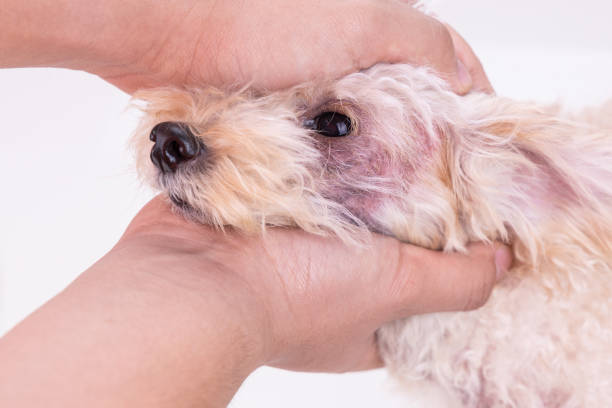Dogs have tongues that are approximately six inches in length. Their saliva is laden with natural enzymes that help cleanse dirt and infections from their skin. Additionally, dogs have a tendency to lick any wounds, ulcers, or gashes on their bodies because their saliva contains components that alleviate pain and reduce swelling and also promote recovery.
Dogs have concise digestive tracts, so they don’t need to chew their food much before swallowing it all at once. This is why you’ll often see them eating things like grass, leaves, sticks, or other items that humans wouldn’t consider food at all! It’s not uncommon for a dog to eat something and then throw it up later to get more nutrients from what they just ate – doesn’t this sound gross?
Ever wonder why your dog’s tongue is so pink? It’s not just because dogs are naturally carnivores (meat-eaters), although this does play a role. When you look closely, you’ll notice that the top surface of their tongue is mainly smooth, but the backside has lots of tiny bumps or pustules, which give it a pink colour. These bumps are called papillae and secrete an enzyme called lingual lipase, which helps the dog digest fat in his food.
Sometimes if your dog eats something that’s gone wrong or that’s poisonous to dogs, you’ll notice that their tongue starts to swell up. It can even become so swollen that it affects their breathing, and they must work hard to breathe normally.
As a dog ages, its tongue may turn a dark blue, purple, or even black. This is also normal as long as he can still properly breathe and swallow food just fine. The condition of the tongue usually has nothing at all to do with how healthy a dog is. Changes in their tongues as they get older have nothing to do with health at all.


Have you ever taken care of an old dog who could no longer stand up on his own? As he ages, a senior dog’s tongue will usually lose its pink colour and turn a much lighter shade of pink or even a pure white colour. Sometimes it will even turn greyish-white as your pet gets closer to passing on.
Dogs that have been spayed or neutered often develop issues with their tongues because the hormones they no longer produce can affect their general health and cause problems for them as they get older. As dogs’ testosterone levels drop, their tongues may also become black or dark blue. Their tongues may even start to swell up and grow very, very large as well.
Consider getting your dog neutered if you don’t want any puppies from him anymore, but realize some issues can result from the surgery, which isn’t always obvious. For example, his tongue may become black or dark blue when a dog’s testosterone levels drop. It could also swell up and get very large as well. Changes like this can happen because of the surgery itself, so try to watch your pet for any warning signs that he may be having problems related to neutering.
Get to know what is normal for your dog so you can learn to spot serious health problems quickly. Signs of illness include:
- Trouble breathing
- Vomiting
- Coughing up blood
- Diarrhoea
- Excessive drooling or slobbering
You should also get familiar with the way your pet’s tongue usually looks so that if something changes, you’ll notice right away.


Even though dogs tend to love licking and chewing on things, it’s important to discourage this type of behaviour, especially for German Shepherds. Sores or other open wounds should be treated immediately so that infection does not occur.
If you notice that your dog has an injury, wash the wound with warm water and mild soap. Afterward, make sure you dry it off completely and apply a thin layer of antibiotic ointment to the affected area.
If your dog gets something stuck in its mouth or tongue, don’t try pulling it out! They’re likely to bite you accidentally, which could cost you a trip to the doctor’s office and antibiotics at the very least. Be sure to have a muzzle on hand just in case this happens so you can get that item out of your pet’s mouth safely.
The tips of a dog’s tongue are the parts that usually get black, blue, or greyish-white in colour as they age. Their tongues may also swell up and get very large from time to time. If you notice that your dog’s tongue is black, he may suffer from a melanoma condition. He could also have an injury of some kind, so it’s essential to get him checked out by a vet immediately.
If the tip of your dog’s tongue turns grey or white and he can still swallow and breathe just fine, then there’s no reason to be too worried. As long as he seems to feel good and usually acts otherwise, you can help him by giving him lots of tasty treats or making his favourite meal.


There are plenty of old wives’ tales about what colour a dog’s tongue should be, but the fact is that there’s no way to know. For example, people sometimes think that if your dog’s tongue is black, he has worms. That isn’t true because many dogs have black tongues, but there aren’t any parasites or infections to be concerned about.
It would help if you also realized that licking themselves with the tip of their tongue is something that dogs do because saliva contains enzymes and natural disinfectants that help keep them clean and healthy. Dogs like to lick wounds and sores on their bodies, allowing those substances to soak into the skin for faster healing.
If your dog’s tongue starts turning black or gets very, very large, he may suffer from a melanoma condition. This is the most common type of cancer in dogs and happens when cells in their bodies start growing out of control. It tends to form deep within the mouth and tongue and may be very difficult to treat at first.
While most cases of melanoma don’t spread to other parts of a dog’s body, it can still produce red blood cells, which make his saliva turn black. If you notice that your dog’s tongue is this colour, he could suffer from a lot of pain and might not want to eat or drink anything at all.
In some cases, if enough time has passed since cancer started growing, a vet may opt to remove part or all of a dog’s tongue to save his life. That’s because melanoma that starts growing in the mouth or tongue can be extremely difficult to fight with radiation or chemotherapy.


Once your dog has kept cancer at bay for an extended time, then you might find that his tongue grows back wholly black, but it may take months or even years before this happens. That’s why it’s important to wash any sores or wounds on your dog’s body with warm water and mild soap as soon as possible.
If your vet believes that your canine companion is suffering from melanoma, then he may choose to remove part of his tongue to save his life. This type of cancer usually starts growing inside a dog’s mouth and tongue, but it can also show up outside his body. To stop this from spreading to other parts of your dog’s body, you’ll need to have him use a special shampoo regularly along with plenty of warm water and mild soap.
While melanoma is one of the most common types of cancer found in dogs, it isn’t the only one. Several other health conditions can cause a dog’s tongue to change colour, too. For example, if your canine companion is suffering from pancreatitis, his mouth will probably turn black and swollen and painful.
In this case, he’ll also be vomiting frequently and might have diarrhoea. Dogs suffering from tonsillitis may also experience black staining on their tongues, but this only happens when the infection is very severe. If your dog’s tongue has turned black or white, then he may be struggling with an autoimmune disease of some kind.
If you notice any changes in his saliva colour, especially if it happens suddenly, then take him to the vet right away. He could be suffering from a condition that affects his saliva production or may have an autoimmune disease.
A dog’s tongue is black because its saliva contains substances meant to reduce pain and swelling and promote healing. That makes it much easier to keep wounds, sores or other injuries clean and free from bacteria. If your dog starts licking a particular part of his body more often than usual, he may develop an infection or wound there.


If this is the case, you might find that some patches on his tongue turn black or white because those areas are also infected. Your vet will want to treat both problems simultaneously and may ask you to start bathing your dog’s tongue once a day with warm water and mild soap.
Most dogs’ tongues are black because of the substances found within their saliva. This allows them to clean dirt, infections, and other types of debris from their bodies so that wounds can heal faster than average. However, if your canine companion is licking his paws, nose, or other parts of his body too often, then he may have developed an infection.
When this happens, some patches on his tongue might turn completely black while others grow white because those areas are infected. A vet will usually recommend that you begin washing any wounds with warm water and mild soap regularly to get rid of the infection before it spreads.
If your dog’s tongue has turned black but isn’t showing any other signs of illness, then you should schedule an appointment with your vet immediately. He could be experiencing some pain or discomfort associated with a particular part of his body, including his ears, teeth or throat. It’s also possible that your dog is suffering from an autoimmune disease of some kind.
If he has been diagnosed with a condition like this, then there are certain medications he will need to take daily to get better. Your vet may also recommend that you start washing any wounds or sores on your canine companion’s body with warm water and mild soap.
If you notice that your dog’s tongue is becoming blacker or darker with time, then it might indicate he has developed an infection in some part of his body. The colour change could be due to the substances found within a canine’s saliva that promote healing and remove dirt, bacteria and other types of debris from their bodies.
If your dog suffers from pancreatitis, he’ll experience painful swelling in his mouth and be vomiting quite often. He may also have diarrhoea, so you should take him to the vet immediately. However, if only his tongue appears blacker than usual, it could indicate an autoimmune disease because certain substances in his saliva are no longer effective at cleaning his body.
Conclusion
Always take your canine companion to the vet if you notice any changes in his saliva colour, especially if it happens suddenly or produces more than usual. If they are suffering from an infection somewhere on their body, some areas of their tongue might be blackened while others grow white because those areas are infected.
Your vet will want to treat both problems simultaneously and may ask you to start washing your dog’s tongue once a day with warm water and mild soap.


